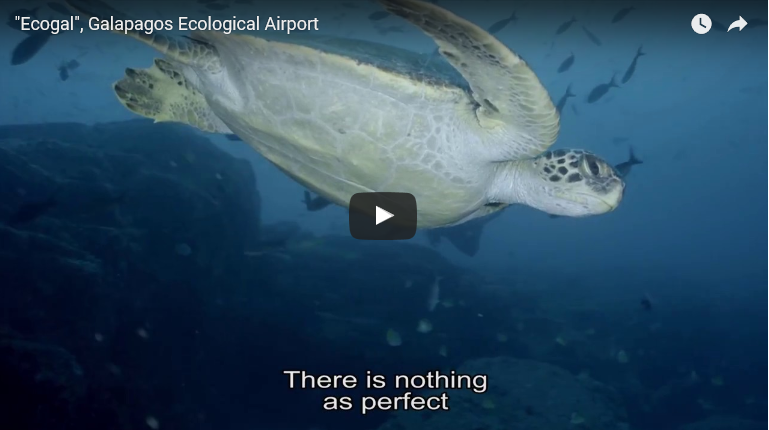Drawing on the country’s strong legal and political commitment to environmental protection, the Government of Ecuador showcased its green aviation innovation and leadership on the occasion of the ICAO Council’s 2017 Visit.
The visit by the Representatives of ICAO’s 36-State Governing Body, who were accompanied by ICAO’s Secretary General Dr. Fang Liu and members of the ICAO Secretariat, featured numerous discussions with international and national aviation leaders on the crucial need to further enhance the sustainability of air connectivity.
These discussions were later expanded upon and illustrated more concretely through tours of the infrastructure that Ecuador is developing, including the remarkable Galapagos Ecological Airport, “Ecogal”, which is unique in the world for the measures it has implemented to preserve the islands’ ecosystems and biodiversity.
“The Council State Visit to Ecuador impressed upon ICAO’s leadership the importance of our positions on aviation environmental protection, not only in terms of objectives like carbon-neutral growth, but also in terms of the protection of the world’s geographic heritage. This latter priority even extends to areas which also happen to be the site of new airport infrastructure, as exemplified by our Ecogal facility,” explained Mr. Ivan Fernando Arellano Lascano, Ecuador’s Representative on the ICAO Council.
“This visit also provided a platform for the highest authorities in aviation to undertake important political and technical discussions regarding the environment,” he continued, “and it has proven to be a historic moment for Ecuador given that it was the very first time the ICAO Council has visited South America.”
In addition to the state-of-the-art technologies and practices being implemented at the Galapagos Ecological Airport in the Islands, a fragile world heritage site with tremendous biodiversity, sustainability issues specific to each of Ecuador’s three distinct continental regions – coastal, Sierra, and rainforest – were presented.
In Quito, Ecuador’s capital city, the construction of the new and high-altitude “Mariscal Sucre International Airport” presented not only technical challenges in terms of air navigation services and environmental impact, but also cultural heritage challenges when significant archaeological treasures were uncovered during its construction. Ecuador’s experience in appropriately managing these challenges will be invaluable to future international guidance regarding these situations. To give another example, at the “Jose Joaquin de Olmedo International Airport”, in Guayaquil, a facility which serves the country’s principle largest urban area and which has received numerous awards for its outstanding airport service quality, Ecuador highlighted its social inclusiveness by way of a programme that actively encourages the employment of disabled people at the airport through a specific recruitment initiative.
ICAO’s Council President, Dr. Olumuyiwa Benard Aliu, recognized and highlighted the significance of both Ecuador’s efforts and of the Council’s Visit in a Keynote Address he gave in Guayaquil, taking this opportunity to praise Ecuador’s regional leadership and to further encourage the region’s ambitions as a whole.
In support of this, he pointed to the significant improvements Ecuador has demonstrated through ICAO’s Universal Safety Oversight Audit Programme (USOAP), and the fact that the safety targets indicated through the region’s Bogotá Declaration are more ambitious than those set forth under ICAO’s Global Aviation Safety Plan. President Aliu also thanked Ecuador’s Ministry of Foreign Affairs and Ministry of Transport for having generously hosted the visit, as well as the President of the Provincial Council of San Antonio de Pichincha for the warm welcome at the site of the Middle of the Earth.
ICAO furthermore underscored the importance of the Visit through the unveiling of a commemorative and congratulatory plaque at Galapagos Ecological Airport, in the presence of Council President Aliu, Secretary General Liu, State Representatives to the ICAO Council including its Vice Presidents, Representatives to ICAO, regional Civil Aviation Authorities, and national high-level authorities of Ecuador.
The 2017 Council Visit to Ecuador took place from 12 to 17 March 2017, and started with a welcome by Ecuador’s Ministry of Foreign Affairs, Ministry of Transport and National Civil Aviation Authority. In addition, the programme included presentations given by ICAO’s leadership, Council Representatives, International Organizations such as Airports Council International (ACI), International Air Transport Association (IATA), the Latin American and Caribbean Air Transport Association (ALTA) and Industry represented by Google, Corporación América S.A, Corporación Quiport S.A., Terminal Aeroportuaria de Guayaquil S.A. (TAGSA), Galapagos Ecological Airport “Ecogal”, and LATAM Airlines, to name a few.
Given the strong focus of the visit on Environmental Issues, it is important to recognise that the Air Transport Action Group (ATAG) offset the full travel CO2 footprint of the ICAO Council trip to the Galapagos Islands using carbon credits from the LifeStraw Project. The number had been determined using the ICAO Carbon Calculator for the flights from Montreal – Quito – Guayaquil – Galapagos – Quito – Montreal.
As States and the aviation industry work together towards the implementation stages of the CORSIA, many have commented that it is important to find offsetting projects that not only reduce CO2 emissions, but also have other benefits such as economic or social impacts.
An informal visit to the Union of South American Nations (UNASUR) Headquarters was also undertaken by the participants in the event, an opportunity which allowed Council Members to learn more about the development of infrastructure projects undertaken by this regional intergovernmental organization which is composed of 12 South American States.

Watch this video and discover "Ecogal", Galapagos Ecological Airport
